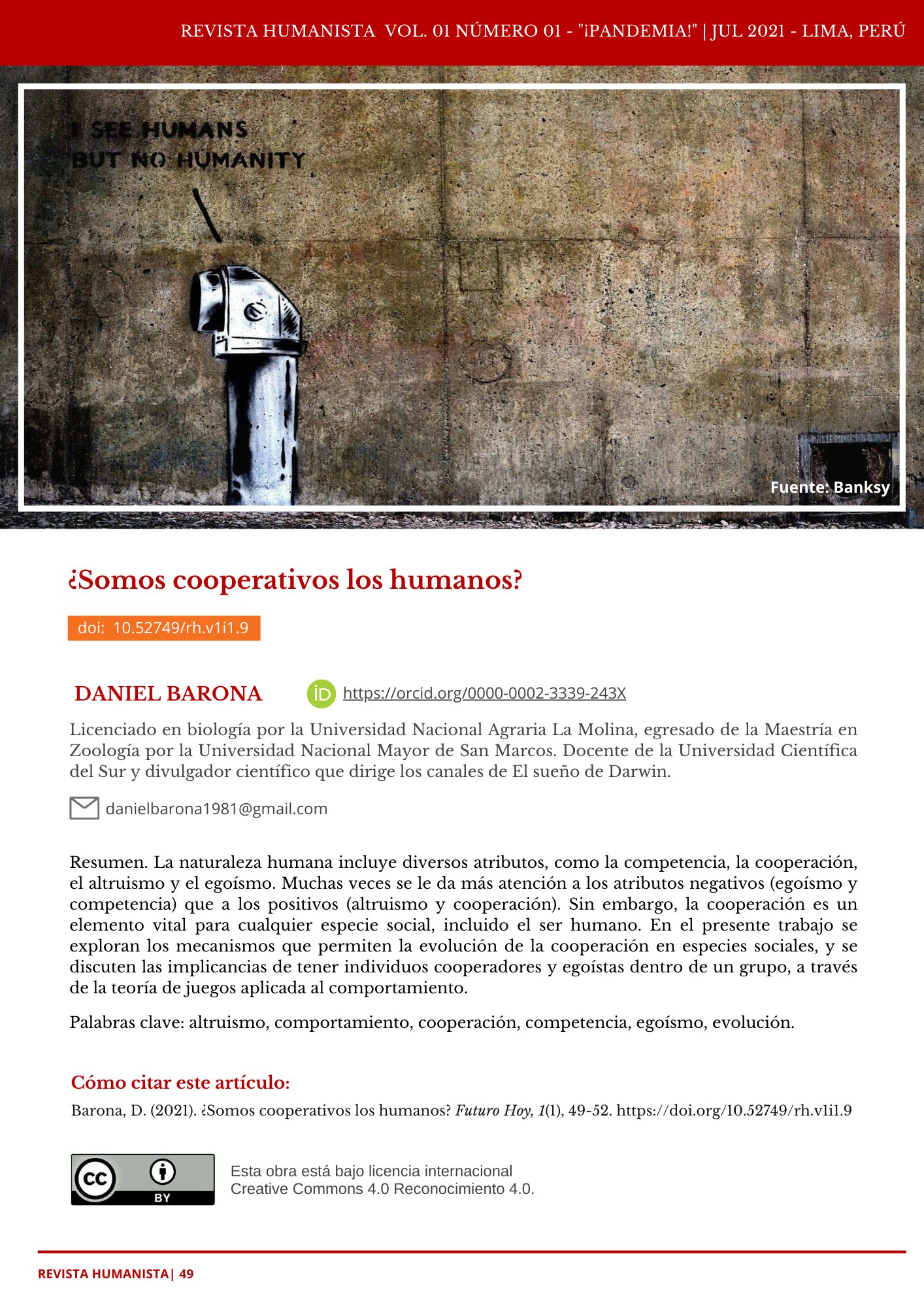¿Somos cooperativos los humanos?
DOI:
https://doi.org/10.52749/rh.v1i1.9Palabras clave:
altruismo, comportamiento, cooperación, competencia, egoísmo, evoluciónResumen
La naturaleza humana incluye diversos atributos, como la competencia, la cooperación, el altruismo y el egoísmo. Muchas veces se le da más atención a los atributos negativos (egoísmo y competencia) que a los positivos (altruismo y cooperación). Sin embargo, la cooperación es un elemento vital para cualquier especie social, incluido el ser humano. En el presente trabajo se exploran los mecanismos que permiten la evolución de la cooperación en especies sociales, y se discuten las implicancias de tener individuos cooperadores y egoístas dentro de un grupo, a través de la teoría de juegos aplicada al comportamiento.
Descargas
Citas
Broom, M., & Rychtár, J. (2013). Game-theoretical models in biology.
CRC Press.
Brosnan, S. F., Salwiczek, L., & Bshary, R. (2010). The interplay of
cognition and cooperation. Philosophical Transactions of the Royal Society B: Biological Sciences, 365(1553), 2699–2710. https://doi.org/10.1098/rstb.2010.0154
Darwin, C.R. (1871). The Descent of Man and Selection in Relation
to Sex. Murray
De Waal, F. (2003). On the possibility of animal empathy. In Feelings
and emotions: The Amsterdam symposium (pp. 379-99). Cambridge University Press.
De Waal, F. (2010). The age of empathy: Nature's lessons for a
kinder society. Broadway Books.
De Waal, F., Macedo, S. E., & Ober, J. E. (2006). Primates and
philosophers: How morality evolved. Princeton University Press.
Earley, R. L. (2010). Social eavesdropping and the evolution of
conditional cooperation and cheating strategies. Philosophical Transactions of the Royal Society B: Biological Sciences, 365(1553), 2675–2686. https://doi.org/10.1098/rstb.2010.0147
Hamilton, W.D. (1964). The genetical evolution of social behaviour, I
and II. J. Theor. Biol. 7, 1–52.
Hoffman, M., Yoeli, E., & Navarrete, C. D. (2016). Game theory and
morality. In The evolution of morality (pp. 289-316). Springer, Cham.
Mailath, G.J., Samuelson, L. (2006). Repeated Games and
Reputations: long-run Relationships. Oxford University Press.
McNamara, J. M., & Leimar, O. (2020). Game theory in biology:
concepts and frontiers. Oxford University Press.
Nowak M.A., Highfield, R. (2012). Supercooperadores.
Grupo Zeta.
Nowak, M. A. (2006). Five Rules for the Evolution of Cooperation.
Science, 314(5805), 1560–1563. https://doi.org/10.1126/science.1133755
Nowak, M. A. (2012). Evolving cooperation. Journal of theoretical
biology, 299(0), 1-8
Nowak, M.A., Sigmund, K. (2005). Evolution of indirect reciprocity.
Nature 427, 1291–1298
Rand, D. G., & Nowak, M. A. (2013). Human cooperation. Trends in
Cognitive Sciences, 17(8), 413–425. https://doi.org/10.1016/j.tics.2013.06.003
Riehl, C., & Frederickson, M. E. (2016). Cheating and punishment in
cooperative animal societies: Table 1. Philosophical Transactions of the Royal Society B: Biological Sciences, 371(1687), 20150090. https://doi.org/10.1098/rstb.2015.0090
Smith, A. (2006). Cognitive Empathy and Emotional Empathy in
Human Behavior and Evolution. Psychol Rec 56, 3–21. https://doi.org/10.1007/BF03395534
Tarnita, C.E., Antal, T., Ohtsuki, H., Nowak, M.A. (2009).
Evolutionary dynamics in set structured populations. Proc. Natl. Acad. Sci,106, 8601–8604
Traulsen, A., & Nowak, M. A. (2006). Evolution of cooperation by
multilevel selection. Proceedings of the National Academy of Sciences, 103(29), 10952–10955. https://doi.org/10.1073/pnas.0602530103
Wilson, M. L. (2020). Hawks, Doves, and mongooses. Proceedings of
the National Academy of Sciences, 202021188. https://doi.org/10.1073/pnas.2021188117

Descargas
Publicado
Cómo citar
Número
Sección
Licencia
Derechos de autor 2021 Daniel Barona

Esta obra está bajo una licencia internacional Creative Commons Atribución 4.0.
El autor de cada artículo o contribución académica publicada en la Revista Humanista se compromete a otorgar derechos de uso a otros gracias al registro en Creative Commons BY 4.0 que la Editorial ha tramitado para su obra. Esto permite el acceso gratuito e inmediato a la obra y permite a cualquier usuario leer, descargar, copiar, distribuir, imprimir, buscar o vincular acceder a los textos completos de los artículos, rastrearlos para indexarlos, pasarlos como datos al software o utilizarlos para cualquier otro propósito legal. Cada autor mantiene los derechos de su obra. La Revista Humanista posee los derechos de publicación de cada artículo. La revista no se responsabiliza por los comentarios vertidos por cada autor.



